
Tell us what you need to find a matching loft conversion specialist

Get free quotes from professionals near you

Compare offers and choose the one that best matches your need
- Householdquotes.co.uk
- Driveway
- Driveway Materials
- Brick Driveway Guide
- Brick Driveway Cost
Brick Driveway Cost UK: The 2024 Guide

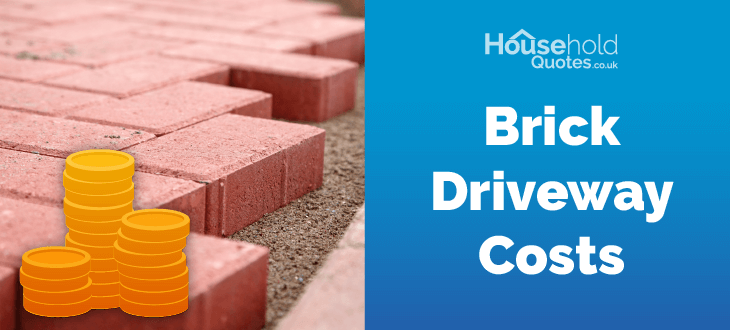
- The cost of a brick driveway for a 20-square-meter driveway ranges from £4,000 to £5,000.
- Brick pavers are more affordable than stone block pavers but pricier than concrete pavers.
- To calculate the cost of a brick driveway, measure the size of your driveway to find the area in square meters, then multiply the area by the number of bricks needed to cover that space.
- 70% of the overall brick driveway cost will go towards labour.
- You can save up to £1,000 on labour by DIY-ing a brick driveway. Still, improper installation may result in sinking and shifting, leading to expensive repairs.
- Repairing a brick driveway is simple. On average, it costs £150 to £200 per day.
When it comes to enhancing your home's curb appeal and functionality, a well-constructed brick driveway is a popular and enduring choice.
Brick driveways are highly sought after in the UK for their charm, durability, security benefits, and property value boost. Making them a great choice to upgrade your home. However, before starting this project, it's essential to understand brick driveway costs.
In this article, we'll break down driveway paving costs to help you plan and budget effectively. From materials to labour costs to other financial considerations, this guide has you covered.
We aim to provide you with the knowledge to make informed decisions and confidently manage and budget your project effectively.
If you're ready to invest in a brick driveway and want the best deal, comparing quotes from driveway specialists is crucial. However, it can be overwhelming.
Household Quotes offers a solution. Our service provides four free quotes from trusted local driveway specialists. Fill out our 30-second form, and we'll tailor four quotes to your needs. Click below to discover more.
- Describe your needs
- Get free quotes
- Choose the best offer
It only takes 30 seconds

How much does a brick driveway cost?
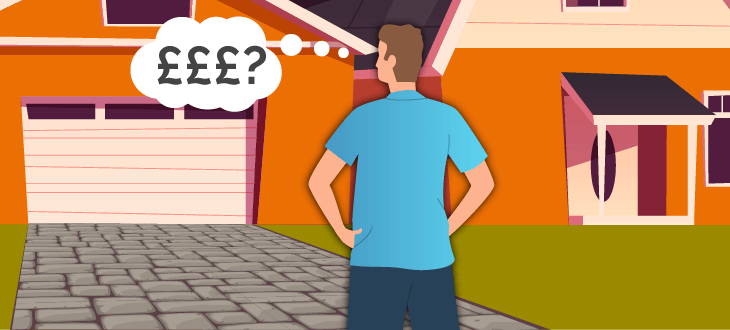
A 20m2 brick driveway costs between £4,000 and £5,000, which covers materials and labour. Factors such as the size, shape, and complexity of the design, as well as the location of your home, influence these costs. Additionally, the quality of the brick used and the expertise of the driveway specialist can affect the price.
Brick pavers are typically a more budget-friendly option for driveways than block pavers. Take Indian stone driveways, for example, which can cost up to £105 per m2 for materials alone. Producing natural stone costs significantly more due to quarrying or mining, whereas mass-producing brick benefits from economies of scale.
Both options are durable, but brick is definitely the way to go if you want to create a distinctive entryway while keeping driveway costs down.
While cheaper than stone block pavers, brick driveways are less cost-effective than other driveways and require more time and labour.
When installing a brick driveway, it is important to excavate the base to a depth of at least 150mm and add a sub-base to distribute weight evenly. A weed barrier is also necessary to prevent weed growth. These are standard procedures for most driveways.
In addition to these standard requirements, brick driveways need an extra layer of sand to hold the bricks in place, which can increase costs. Furthermore, workers must individually place the bricks on the surface, which increases labour costs. After installation, they fill the joints with more sand.
All these additional steps contribute to the higher overall brick driveway cost, making them more expensive than other types of driveway materials.
Cost of a brick driveway vs other materials
Brick driveway costs can be more affordable than other materials like natural stone pavers. Brick pavers, typically made from clay, are mass-produced and relatively inexpensive, making them a cost-effective choice. In contrast, natural stone pavers can be significantly more expensive due to the quarrying and shaping processes involved.
The average cost of a standard 30m2 driveway for two cars is between £6,000 and £6,700. On the other hand, a brick driveway for 20m2 can cost between £4,000 and £5,000. Opting for a brick driveway will likely cost slightly more than the standard driveway.
Brick driveways cost more than concrete pavers or other materials, such as gravel and tarmac, as they are more labour-intensive.
Other types of driveways are considerably cheaper than brick pavers if you want to spend less on a new or updated driveway. Below, we have provided a table of how much a 2-car driveway costs for different materials:
| Driveway Materials | Small driveway (30m2) |
|---|---|
| Tarmac or asphalt | £1,200- £2,100 |
| Resin | £1,800-£3,000 |
| Gravel | £1,050- £1,650 |
| Flat poured concrete | £540-£750 |
| Concrete block paver | £600-£1,800 |
| Bricks | £1,200- £1,800 |
| Indian sandstone pavers | £1,860- £3,150 |
| Cobblestone | £600 -£2,100 |
The costs listed above are for materials only. It's important to note that while some materials may seem cheaper or more expensive initially, you must also consider labour costs.
For instance, cobblestones may be relatively inexpensive. Still, labour is intensive and time-consuming, leading to higher labour costs.
On the other hand, the cost of resin materials may be initially high. Still, installers complete the process more quickly compared to working with bricks or cobblestones.
Overall, gravel is the most cost-effective driveway material due to its easy sourcing and quick installation. It is the best option for those on a tight budget, as it is long-lasting and durable.
When comparing materials, it's essential to consider future costs. For instance, maintaining cobblestone driveways can be more challenging due to the large gaps between the stones.
While you can perform maintenance yourself, it can be labour-intensive and time-consuming. Neglecting maintenance can result in damage, leading to costly repairs. Therefore, it's crucial to consider these factors when comparing the brick driveway costs to other materials.
Brick driveway cost calculator
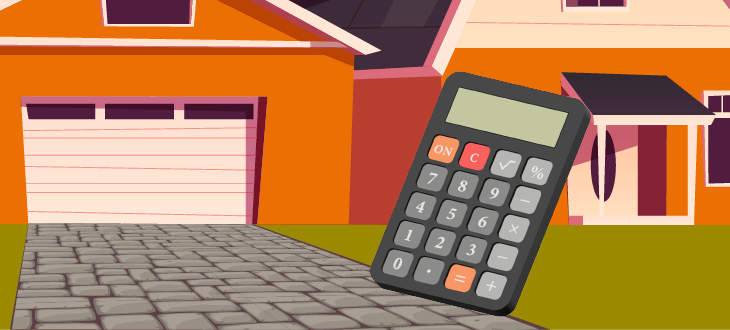
There is no one-size-fits-all approach when calculating your brick driveway cost. Your specific needs and requirements are unique.
However, there are some factors to consider that will give you a rough estimate of what you may spend, which will then help you adjust your budget accordingly. To begin your calculations, you should:
- Measure the total area of the driveway in square metre by multiplying its length by width.
- Next, determine the type and quality of bricks you intend to use, as prices can vary widely.
- Multiply the number of bricks needed per square metre by the total area to get the total number of bricks required.
Factor in additional materials, such as sand, for the base, joints, and edge restraints. Include labour costs, which depend on local rates and the complexity of the installation.
Remember to account for site preparation, which may involve excavation, grading, and disposal of old materials.
Finally, add around 10-15% contingency to cover unexpected expenses. Adding up these components will give you a comprehensive estimate of the total brick driveway cost.
It is essential to consider the extra expenses involved in planning for a brick driveway, such as the type and quality of the bricks, labour costs, additional features, and maintenance. Below, we will provide a detailed breakdown of the costs associated with these factors.
Paving bricks prices: what to consider?
When considering the prices of paving bricks, several factors come into play. Before focusing on the aesthetics or pattern of your brick driveway, it's essential to consider the size and shape of the brick you choose. Most brick pavers come rectangular, but other options exist:
- Cobbles: typically square, measuring 100x100mm or less.
- Bricks: rectangular, usually with dimensions in a 2:1, 3:1, or 4:1 ratio.
- Oversize: rectangular but not adhering to 2:1 or 3:1 ratios, often less than 2:1; commonly referred to as Pamments, Barn Pavers, or other local terms.
- Specials: non-rectangular shapes, such as Bishop's Hats, Parallelograms, and similar forms
Larger size bricks will be quicker and easier to install. In contrast, smaller bricks, such as cobbles, will take longer, increasing labour costs.
Another factor that impacts paving brick driveway costs is the origin and manufacturing location of the clay paver. Locally sourced clay pavers will reduce transportation costs. At the same time, overseas paving bricks will be more expensive due to higher transportation expenses.
Additionally, the prices of paving bricks can be affected by the colour of the clay paver. Clay bricks are available in various natural colours, ranging from terracotta reds and golden buff hues to brown tones and charcoal blues.
Uncommon colours like blue clay pavers tend to be more expensive as they require extra processing to achieve the blue colour. Moreover, if you seek consistency in the colour of the brick, the prices of paving bricks will increase.
Even if you opt for a standard red colour for your brick driveway, there may be colour variations. Expect to pay a higher price for colour uniformity in your driveway.
Finally, the style and finish, such as tumbled bricks, can significantly affect prices. Bricks are tumbled after firing to achieve a more rustic and antique-looking driveway, which can lead to higher brick driveway costs.
What are the average labour costs for a brick driveway?
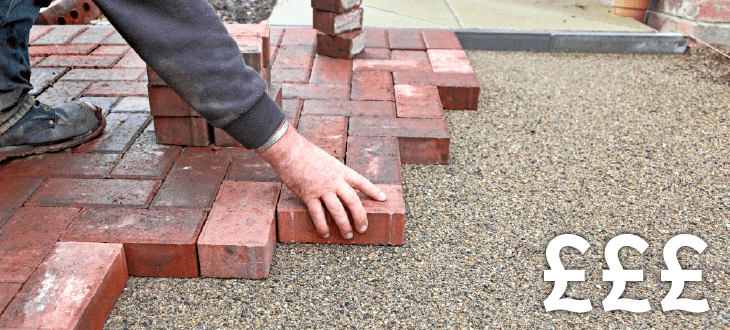
The labour cost for a brick driveway is a significant factor in the overall expense. According to PriceYourJob, about 70% of the total driveway brick price is attributed to labour. Considering labour costs when planning for a brick driveway project is crucial.
Driveway specialists typically charge a daily rate ranging from £150 to £200 per person per day. It's important to note that most driveway specialists work in teams rather than individually, which can result in a higher overall cost due to faster project completion.
The time it takes to install brick pavers is a crucial factor affecting labour costs for a brick driveway. If you have a larger surface or opt for a more complex pattern, the time it takes to complete the installation will increase, thus increasing labour costs. Below is the average timeframe per driveway size:
| Driveway size | Timeframe |
|---|---|
| 40m2 | 4 to 5 days |
| 70m2 | 5 to 6 days |
| 100m2 | 7 to 8 days |
More experienced driveway specialists will command higher fees. While choosing less experienced and cheaper installers might be tempting, working with skilled professionals can ensure a well-made brick driveway, reducing the risk of future issues such as uneven surfaces or sinking.
You can expect lower brick driveway cost by choosing local driveway specialists as transportation costs are reduced.However, in cities such as London, driveway installers often charge higher rates because of the higher cost of living and challenges associated with accessing properties in densely populated areas.
Furthermore, if your driveway requires a significant amount of excavation and groundwork to prepare the base for the new driveway, this can also affect the labour costs for a brick driveway. More time and equipment will be needed to remove extra waste, such as an old driveway, contributing to increased labour costs.
Brick driveway cost UK: finishes and maintenance
Brick driveway costs in the UK can vary significantly depending on the choice of finishes and the required maintenance. High-end finishes, such as tumbled bricks, are more expensive due to the additional processing needed to achieve their unique textures and appearances.
Moreover, intricate patterns or custom designs can also increase labour costs. You have a few patterns to choose from when designing your brick driveway. The most popular is a herringbone pattern.
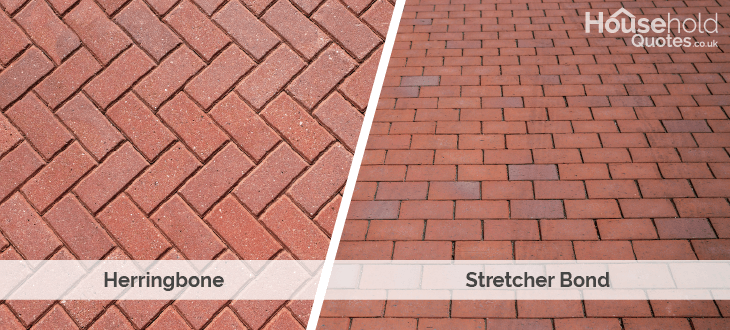
The herringbone pattern provides exceptional durability and weight distribution. However, as it is a more complex design, the cost of the brick driveway will increase. A stretcher bond pattern offers a cost-effective solution to the brick driveway cost as it is easy to install, reducing labour prices.
Maintenance is another crucial factor influencing overall expenses. Brick driveways, though durable, require regular upkeep to maintain their appearance and functionality.
This includes periodic cleaning, weed control, and re-sanding of joints to prevent shifting. According to PriceYourJob, you will be expected to pay between £8.50 and £12.50 per m2 for driveway cleaning, sanding, and sealing.
A weed barrier can be placed during installation to reduce weed maintenance and future brick driveway costs. The cost of weed barriers can range from £30 to £50 per square meter.
In conclusion, quality finishes and regular maintenance can improve a brick driveway's longevity and visual appeal, even though it may come at a higher price.
Cost of a brick driveway: repairing or resurfacing
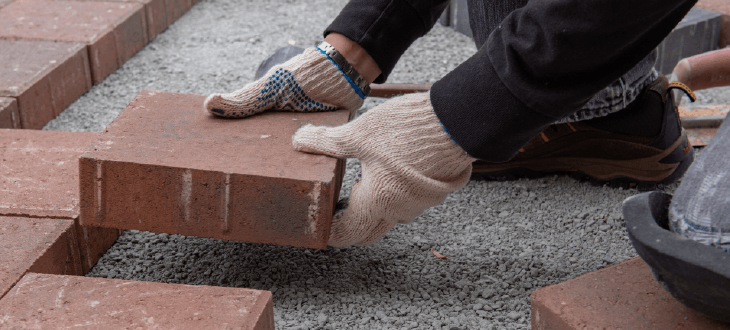
While durable and visually appealing, brick driveways can encounter several common issues requiring repairs. One primary problem is the settling or shifting of bricks, often caused by an improperly prepared sub-base or natural ground movement, resulting in an uneven surface.
Another common issue is the growth of weeds and grass between the bricks, which can disrupt the uniformity and stability of the driveway.
Over time, bricks can crack or chip due to heavy loads, extreme weather conditions, or freeze-thaw cycles. Erosion of the jointing sand, which helps keep the bricks in place, can lead to further instability and gaps.
Repairing damaged bricks is straightforward and requires less labour than asphalt or concrete driveways. On average, labour costs will range from £150 to £200, and installing new bricks should take one to two days.
Resurfacing an old driveway is also dependent on labour costs. Removing an old driveway is estimated to take between one to two days. However, if your current driveway is made from concrete or tarmac, it may take longer as it is more difficult to remove. Consider these factors when looking into brick driveway costs.
Furthermore, you will need to hire a skip to remove an old driveway. The price of the skip depends on its size. Small driveways will require small skips, which can reduce the overall brick driveway cost. Below are the estimated costs of skip hire per skip size:
| Skip size | Average price |
|---|---|
| 2 to 3 yards | £65 |
| 4 to 5 yards | £90 |
| 6 yards | £155 |
| 8 yards | £135 |
| 10 yards | £170 |
Can you DIY a driveway with cheap paving bricks?
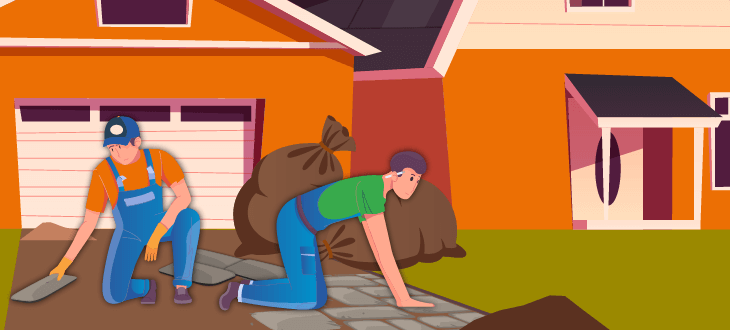
DIY-ing a driveway using cheap paving bricks can save about £1,000 on labour costs. However, several important considerations must be made to ensure a successful and durable result.
- First, thoroughly plan the project by measuring the area and calculating the required bricks.
- Then, prepare a proper sub-base by excavating the driveway area to a depth of around 150mm. You may need a mini-digger, which can cost a weekend between £200 and £300.
- Next, fill the excavated area with a layer of compacted gravel or crushed stone, which will help with weight distribution. The average cost of a sub-base MOT type 1 is around £53 per 50mm.
- Consider using a weed barrier, which will cost between £30 to £50 per m2, to avoid higher maintenance requirements. This should be placed after the sub-base is added.
- Add a layer of hardcore, which will cost, on average, around £300, with a minimum depth of 100mm. The hardcore needs to be well compacted and flattened, for which you can hire a compactor for £20 to £50 per day.
- Next, add a 50mm thick layer of damp, sharp sand, which costs an average of around £250.
- Lay the bricks of your choice in your desired design on the driveway.
- Once the bricks are laid, brush in kiln-dried sand between the joints, which will cost around £250 on average.
Opting to do your brick driveway can lower the brick driveway cost, but it will require your time, effort, and some specialised tools. Additionally, you must purchase all the materials if you choose the DIY route.
Moreover, poorly installed driveways can lead to long-term costs and compromise quality, potentially causing sinking, shifting, and damage to the brick pavers.
Choosing driveway specialists over DIY is smarter due to their expertise, access to specialised tools, and ability to ensure a high-quality, durable installation. Comparing multiple quotes is your best option to lower the overall brick driveway cost.
At Household Quotes, we offer four free, non-binding quotes tailored to your needs. Fill out our 30-second form to obtain these quotes as soon as possible. Click below to find out more.
- Describe your needs
- Get free quotes
- Choose the best offer
It only takes 30 seconds

FAQ
Brick driveways are a good choice because they provide a durable and secure entryway to your home. Additionally, they can increase the value of your property and its curb appeal due to the unique patterns available and the rustic charm they provide.
In the UK, an average 30-m2 two-car driveway costs £6,000 to £6,700. The cost of your driveway will depend on its size, shape, the material you choose, and location.
Brick driveways are more expensive than concrete because they require more labour to install, as each brick needs to be placed individually.
The cheapest option for a driveway is gravel. Gravel is readily available and accessible to source, which reduces material costs. It is also easy to install, reducing overall costs by cutting labour expenses and timeframes.

Caoimhe is an experienced content writer and researcher who is passionate about providing accessible information to every reader. With a background in English literature and Sociology, she combines the two disciplines to create cohesive, well-thought-out, and well-informed pieces.
